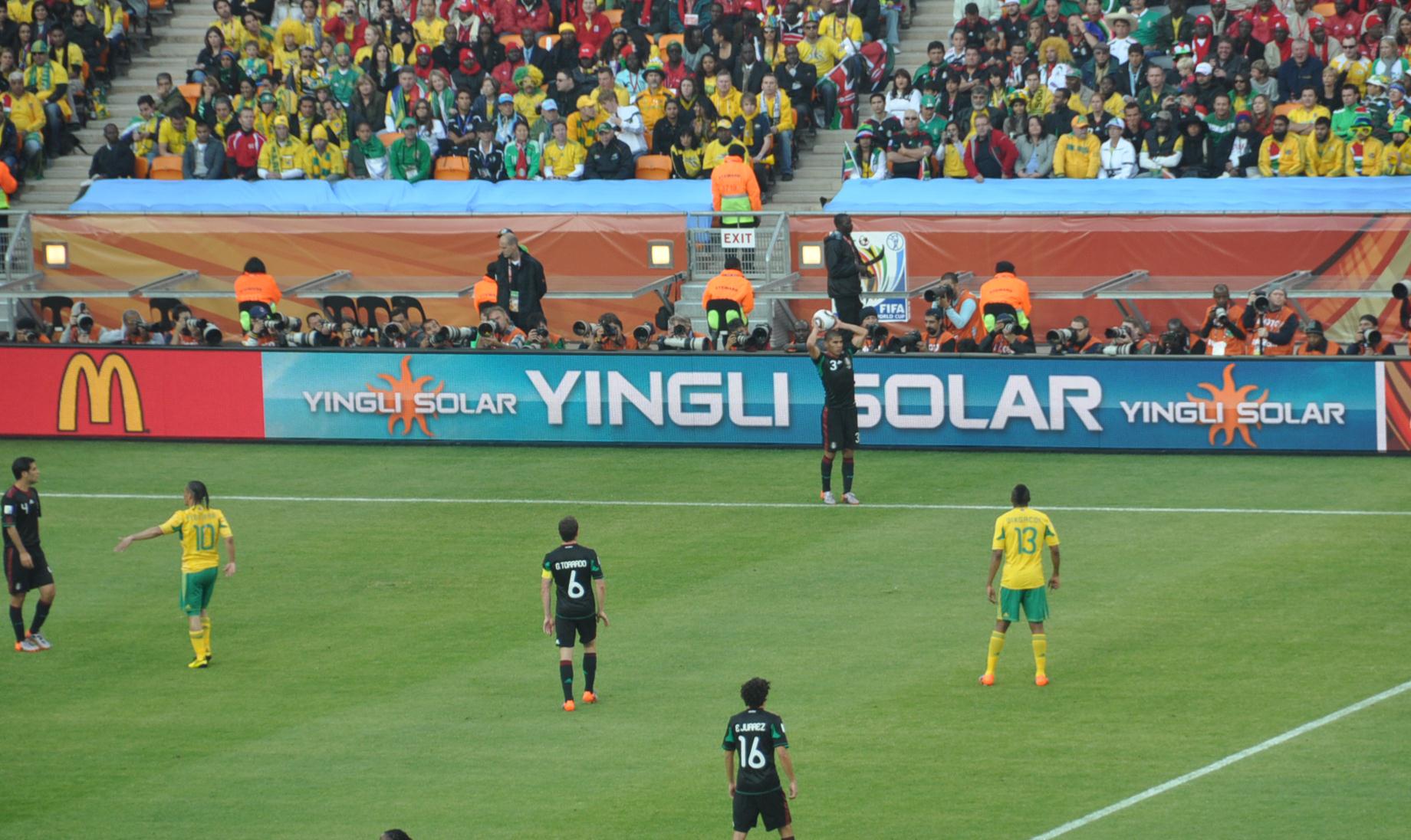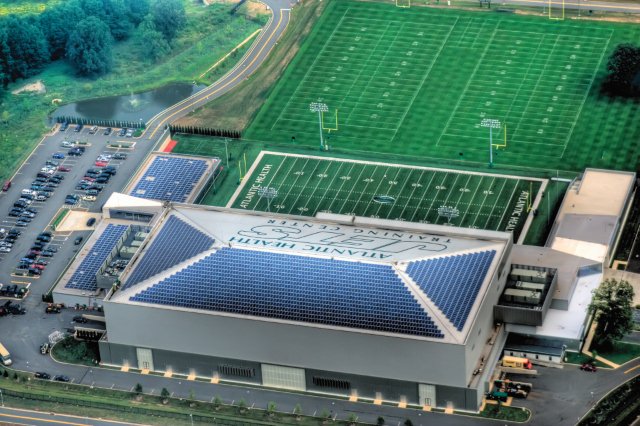I remember watching the World Cup Soccer matches this summer, but I didn't last long because the constant humming of those plastic horns in the background drove me batty. Then, lo and behold, what do I see among the signage promoting the event sponsors -- mostly major consumer marketers who paid gazillions to reach a worldwide audience -- but Yingli Solar. Could that be the same Yingli that I know as Yingli Green Energy (YGE)? I wondered why a solar outfit would advertise during the World Cup amidst the sporting goods, soft drinks and automobiles?

Yingli Solar at 2010 World Cup
This piqued my curiosity, which led to a series of interviews with Yingli executives. (I should disclose here that I am an investor in various solar companies including Yingli.) Here is my report:
"We believe the solar industry is at a tipping point," said Judy Lee, Director of Corporate Development for Yingli. "The solar industry continues to become more competitive. FIFA is a great platform to address our target market, specifically emerging economies that we hope to penetrate. FIFA wanted a Chinese partner with a clean energy focus; it was a strategic match for us." This made me wonder if Joe Lunchbucket hooting and hollering for his favorite soccer team would really be interested in putting solar panels on the roof of his doublewide? I guess FIFA is like the NFL, reaching audiences across the socioeconomic spectrum?
"From a sales perspective, the World Cup didn't help us because we were already sold out of panels for the year. We are building the Yingli brand - this is long term strategy. Our brand awareness has increased as indicative in markets where subsidies are strong. Definitely more leads from World Cup," Lee explained. She added that Yingli has also put together a team sponsorship of the NFL's New York Jets, designed to reach the U.S. market since soccer is not as mainstream in the States.

NY Jets Training Center
Yingli is one of the premier Chinese solar companies, among hundreds out there. Yingli's head office is in Baoding about 100 miles southwest of Beijing, with manufacturing facilities in Baoding and a smaller but growing presence in Hainan. They have over 7,000 employees, including a small group of about 20 management staff that started just over a year ago in the U.S., known as Yingli Americas. Yingli is publicly traded and is not owned by the Chinese government. This has been an area of confusion, as it is with many of the Chinese solar firms. The reality is that Yingli is making it on its own, without government backing.
And doing a bang up job of it by the numbers. Third quarter revenue rose 21.7 percent to $490.9 million, and with earnings of $68.2 million, compared with only $17.7 million a year ago. So how do you explain the equities market punishing Yingli along with several other leading solar firms, as the stock sold for over $13 a year ago and is now loitering below $11? I'm no stock analyst but the market seems to have lost confidence in solar as a renewable energy solution. In fact, just the opposite would seem the case as leading solar firms continue to rack up significant growth and profits. Yingli's business model offers social, environmental and financial benefits by saving customers money, reducing carbon output, creating green jobs and producing strong profits for investors.
Yingli's projected global sales of $1.76 billion is split between major markets in Germany, the U.S., Italy, France, Czech Republic, Japan, South Korea and China. South Africa is also considered a growth market. Sales for 2011 already exceed capacity, which will surpass 1 Gigawatt. (To put that figure in perspective, total solar electric capacity installed for 2010 is approximately 13 Gigawatts.) Yingli projects revenue to continue skyward, reaching $2.25 billion for 2011. Yingli is a cost leader, but maintains high margins through its vertically integrated supply chain, from polysilicon to wafers.
One reason we should embrace domestic, Chinese or any other solar firm with operations on U.S. soil is because of the green jobs they bring. However, Yingli's once-planned U.S. plant has been scuttled due to the devaluation of the Euro, with no immediate plans to put it back on stream. Yingli had full intentions of building a 100 megawatt plant in Phoenix or Austin, acknowledges Helena Kimball, Yingli's Director of Communications. However, as the Euro severely declined in early 2010, they could not make it pencil, even with hefty tax incentives from both the Feds and the States. "The last thing we wanted to do is hire hundreds of people then have to close the plant," Kimball explained. It should be noted that SunTech Power just opened a 30 megawatt plant in Goodyear, AZ that went operational as of October.
Yingli has also been working on building out its team of highly qualified professional managers, for example, Vice President of Marketing Jason Liu. After getting a PhD in semiconductor engineering at Stanford, Liu worked for IBM, then became a McKinsey consultant prior to joining Yingli. Liu sees promoting the entire solar sector as key for the company. "The development of the industry and overall market is very important," he said. "We must make solar energy a economic solution for everybody." I was impressed with all Yingli's managers -- both in the US and China -- they are highly educated, with deep solar experience and for a Chinese company, mostly forthcoming in their assessments (Chinese firms are known to be rather secretive).
When asked about the competition, Yingli's brass mention First Solar as an industry and price leader. FSLR is an ominous competitor for Yingli, but the company professes to see them more as ally. "The solar market is very collaborative, especially on policy issues, and we need to work together to continue to promote industry standards, " said Kimball. "We are committed to technological excellence, we need to be ahead of the curve." Distributed solar is one strategy that Yingli will employ toward that goal. Kimball explains this concept: "By generating electricity at or near residences, commercial buildings, or municipal loads, permitting is fast-tracked, installations are quick, efficient, and cost-effective. Yingli is one of the leading panel suppliers in the US's top solar markets, California and New Jersey, in large part due to our strategy of aligning with developers, integrators and utilities focused on the distributed generation model."
I guess you could call YGE the "challenger brand" to borrow from consumer marketing-ese. While First Solar is the acknowledged leader and low cost supplier, they are concentrating on thin film solar technology while Yingli is relentlessly driving down costs of traditional panels. And while FLSR is well known among investors -- and is famous for attracting Walton money early on, which reportedly made America's retailing kings over $1 billion on their seed money -- Yingli may just be the next solar brand to hit it out of the park. From a marketing and brand building standpoint, they are putting pedal to metal and trying to distinguish themselves. Yingli could potentially eclipse First Solar to become the household name for solar with its aggressive marketing and consumer focus. From Sierra Club Green Home's perspective, any company making residential solar panels more affordable for Americans has our vote.